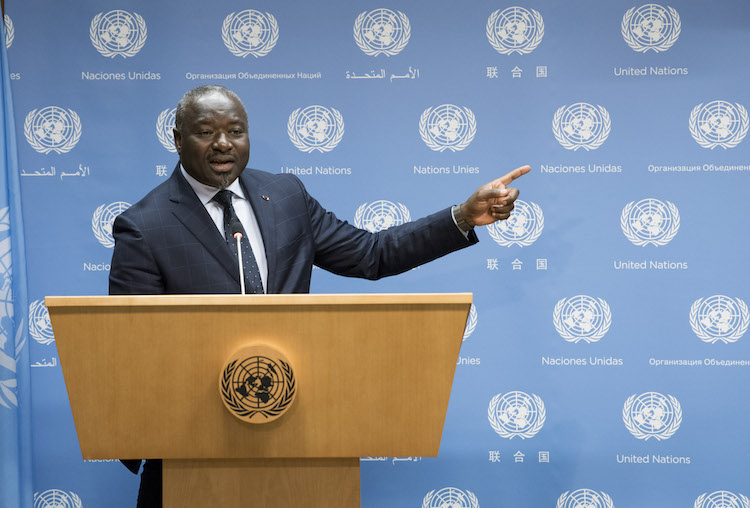By Ramesh Jaura
VIENNA (IDN) – “The urgent importance of bringing the Comprehensive Nuclear-Test-Ban Treaty (CTBT) into force, as a core element of the international nuclear disarmament and non-proliferation regime,” was a highlight of the first session of the Preparatory Committee (PrepCom) for the 2020 NPT Review Conference from May 2-12 in the capital of Austria.
The PrepCom’s Chair Henk Cor van der Kwast noted in his factual summary: “The intrinsic link between the Comprehensive Nuclear-Test-Ban Treaty and the goals and objectives of the Treaty was stressed.” 111 States parties to NPT, the Treaty on the Non-Proliferation of Nuclear Weapons participated in the work of the Committee at its first session. | CHINESE | JAPANESE | NORWEGIAN | SWEDISH
CTBT – negotiated in Geneva between 1994 and 1996 – is almost universal but has yet to become law. 183 countries have signed the Treaty, of which 164 have also ratified it, including three of the nuclear weapon States: France, the Russian Federation and the United Kingdom.
But 44 specific nuclear technology holder countries must sign and ratify before the CTBT, which has been in limbo for 20 years, can enter into force. Of these, eight are still missing: China, Egypt, India, Iran, Israel, North Korea, Pakistan and the USA. India, North Korea and Pakistan have yet to sign the CTBT.
The PrepCom participants agreed with Lassina Zerbo, Executive Secretary of the Preparatory Commission for the Comprehensive Nuclear-Test-Ban Treaty Organization (CTBTO), that the Treaty will provide the global community with a permanent, non-discriminatory, verifiable and legally binding commitment to end any nuclear weapon test explosion or any other nuclear explosion, as a means to constrain the development and qualitative improvement of nuclear weapons, which limits both horizontal and vertical nuclear proliferation.
The participants stressed that positive decisions on that Treaty by the nuclear-weapon States would have a beneficial impact towards the ratification of that Treaty. Those States were called upon not to wait for other States to ratify that Treaty first.
“The special responsibility of the nuclear-weapon States to encourage countries listed in Annex 2 of that Treaty to sign and ratify the Comprehensive Nuclear-Test-Ban Treaty was reaffirmed, and the nuclear-weapons States were called upon to take initiative in this regard,” PrepCom Chair’s draft summary said.
While States parties welcomed the existing de facto moratorium on nuclear test explosions, many expressed the view that this was not a substitute for a permanent and legally binding commitment to end nuclear weapon testing and all other nuclear explosions, which can be achieved only by the entry into force of the Comprehensive Nuclear-Test-Ban Treaty. It was emphasized that the importance of refraining from any activities that would defeat the object and purpose of the CTBT.
A working paper submitted by the members of the Non-Proliferation and Disarmament Initiative (NPDI) reaffirmed the members’ strong commitment to strengthening the nuclear test ban regime, including the entry into force of the CTBT “at the earliest possible date, as well as to advancing global nuclear non-proliferation and disarmament.”
The Initiative is a diverse cross-regional grouping of non-nuclear-weapon States comprising Australia, Canada, Chile, Germany, Japan, Mexico, the Netherlands, Nigeria, the Philippines, Poland, Turkey and the United Arab Emirates.
Yet another highlight of the May deliberations was the participation of Japanese Foreign Minister Fumio Kishida whose hometown Hiroshima, along with Nagasaki, suffered atomic bombs in 1945. He urged cooperation between nuclear states and non-nuclear states to prevent the spread of nuclear arms.
“North Korea has conducted two nuclear tests and launched more than 30 ballistic missiles since last year. Its nuclear and missile development has reached a new level and is posing a real threat to the region and beyond in the international community,” Kishida told the PrepCom on May 2.
“The efforts toward a world without nuclear weapons should be “carried out in a realistic manner, while taking into account the security environment that is becoming increasingly severe, including that of North Korea,” Kishida said.
Another Japanese national, Izumi Nakamitsu, High Representative for Disarmament Affairs United Nations (UNODA), said in a statement on May 8 – one week after assuming responsibilities – that a priority task for the Preparatory Committee should be “the formulation of recommendations to ensure the full implementation of past commitments.” She said she was encouraged that all parties seemed to agree that the outcomes reached in 1995, 2000 and 2010 remain fully valid.
“In this regard, measures to promote accountability, transparency and mutual trust could be essential and could build upon the accomplishments of the previous cycle. The Committee should also seek to identify as early as possible a new common vision for the implementation of the 1995 Resolution on the Middle East. This should include the early restart of inclusive dialogue among the States of the region.”
The significance of UNODA High Representative’s remarks is underlined by the fact that, as in 2005, the 2015 Review Conference (from April 27 to May 22, 2015) in New York was unable to reach agreement on any substantive outcome documents. Three States parties – the U.S., Britain and Canada – crashed the conference because of objections of a non-state party, Israel.
The three states charged that Egypt had wrecked the conference with its demands that the Review Conference’s final declaration reiterate the call for creation of a Middle East Nuclear Weapons-Free Zone.
Such a zone was, however, envisaged by the 2010 Review Conference, which produced conclusions and recommendations for follow-on actions in the areas of nuclear disarmament, nuclear non-proliferation, peaceful uses of nuclear energy and the Middle East, particularly implementation of the 1995 Resolution on the Middle East. [IDN-InDepthNews – 14 May 2017]
Related articles:
Preparing for 2020 Nuclear Non-Proliferation Review Conference
2020 NPT Review Conference Needs Innovative Strategies
Photo: CTBTO Executive Secretary, Lassina Zerbo addressing PrepCom on May 2, 2017.


